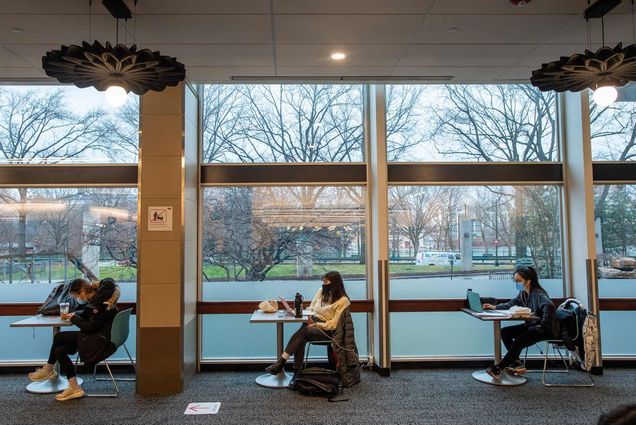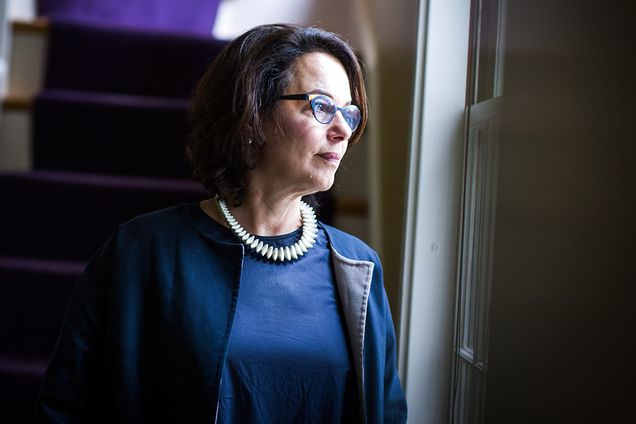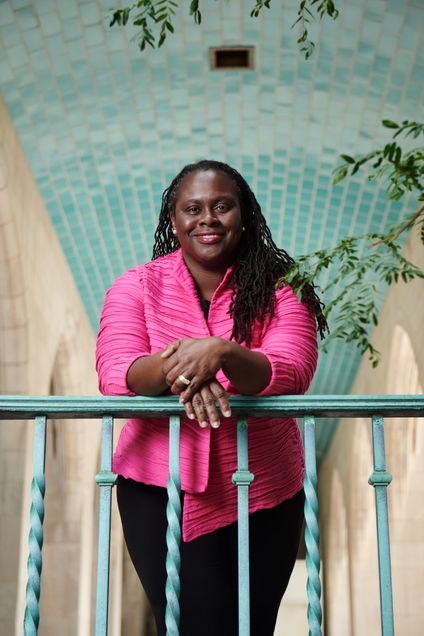News
Meet BU’s Newest AAAS Fellows
A pioneer in treating anxiety, one in turning moon dust into oxygen, and one in developing disease diagnostics for low-resource communities recently appointed fellows
Each year, the American Association for the Advancement of Science (AAAS) recognizes scientists who have made major contributions to their fields of expertise. As the chaotic and uncertain year of 2020 neared its close, three Boston University researchers joined those ranks as new AAAS fellows, honored and acknowledged for their deep expertise, one in biomedical engineering, one in sustainable energy solutions, and one in clinical psychology. The Brink reached out and asked each of them to reflect on joining the AAAS fellows and the highlights of their research careers.
Read the full story on the Brink!
College Access Group QuestBridge and BU Partner to Give Need-Based Scholarships
Up to 30 undergrads will matriculate in fall 2022, with all expenses paid

BU will partner with California nonprofit QuestBridge to provide all-expense-paid scholarships to the University, starting in fall 2022. Photo by Cydney Scott.
As many as 30 low-income high-achieving students will matriculate at BU in fall 2022—on full scholarships, with no loans or parent contributions—thanks to a new partnership between the University and a nonprofit promoting college access.
California-based QuestBridge matches member universities and colleges with high school students, most of them the first in their family to attend college, says Kelly Walter (Wheelock’81), BU’s associate vice president for enrollment and dean of admissions. BU becomes the 45th institution to partner with Questbridge, and the partnership caps two years of work on the collaboration, Walter says.
Money for the scholarships will be provided by BU, which spent $290 million on financial aid in the 2020 fiscal year. QuestBridge recruits applicants and culls the number down to finalists (nearly 7,000 this year), who are asked to name the member institutions they’d like to attend. QuestBridge then forwards their applications to those schools for consideration.
“There is no required commitment to select a predetermined number of students as QuestBridge Scholars,” Walter says. “As is often true, the number of offers will depend on the strength of our applicant pool. However, it is likely that BU will welcome between 20 and 30 QuestBridge Scholars in the fall of 2022.”
Read the full story on BU Today.
BU Launches Racial Data Lab

POLICY RESOURCE
BU Launches Racial Data Lab
The University's Center for Antiracist Research and Faculty of Computing & Data Sciences are bringing antiracist researchers together with data scientists to expose and eliminate racial inequities. Find out more

RESEARCH HIGHLIGHT
How the Biden Administration Can Expand Healthcare Access in Its First 100 Days
BU healthcare experts Paul Schafer and Nicole Huberfeld outline the tools the new Administration has at its disposal to quickly improve coverage during the current crisis and beyond. See what they recommend

FACULTY EXPERT
Why the Attack on the Capitol Was an Act of Terrorism
BU researcher Jessica Stern, an expert on far-right violence and white supremacists, discusses the attackers' motivations and what can be done to prevent further violence. Read her insights
BU INFLUENCERS
In Case You Missed It...
Join the BU Institute for Sustainable Energy for a discussion with Rep. Sean Casten (D-IL) on climate policy on January 29th... BU economist Ray Fisman makes the case for higher wages in hard times in The Wall Street Journal... BU School of Public Health Dean Sandro Galea urges reparations for Black Americans in Politico... BU Pardee School of Global Studies Dean Adil Najamspoke with 99 global thought leaders on what the post-COVID-19 world will look like... John Connor of the BU School of Medicine explains where COVID-19 came from to USA Today...Taylor Boas of the BU College of Arts & Sciences discusses the impact of Argentina legalizing abortion in The Washington Post... BU alumnus Reverend Silvester Beaman (STH’85) gave the benediction address at President Biden's inauguration.
Biden Issues Orders on Loans, Immigration
BU IN DC
The Biden Administration recently announced the appointments of the following BU alumni:
Wendy Sherman (CAS '71) has been nominated as deputy secretary of the U.S. Department of State. She previously served as the lead negotiator of the Iran nuclear deal for the Obama Administration.
Kei Koizumi (UNI '91) is chief of staff to the White House Office of Science and Technology Policy (OSTP). Koizumi worked at OSTP for the entire eight years of the Obama Administration.
Gina Lee (CGS, '08, COM '10) is director of scheduling for First Lady Jill Biden. Lee previously worked on the Biden campaign and for the Biden Foundation.
Justin Maxson (GRS '96) has been named Deputy Under Secretary for Rural Development at the U.S. Department of Agriculture (USDA). Maxson led an economic justice foundation prior to joining USDA.
BIDEN ISSUES ORDERS ON LOANS, IMMIGRATION
Joseph R. Biden and Kamala Harris were sworn in as President and Vice President of the United States on Wednesday. Within hours of taking office, Biden issued a series of executive actions to jump-start the Administration's policy agenda:
- Student loans: Extending the current suspension on federal student loan repayment until September. The pause was scheduled to expire at the end of January, after being enacted in the CARES Act and extended by the Trump Administration.
- Racial equity: Revoking the previous Administration’s executive order on race and sex stereotyping, which prohibited federal agencies from supporting certain types of diversity training. The Biden order also mandates federal agencies conduct an equity assessment, instructs federal officials to gather data to measure and advance equity, and cancels the authority of the Trump Administration's 1776 Commission on American history.
- Immigration: Reinvigorating the Deferred Action for Childhood Arrivals (DACA) program, which provides legal status for undocumented youth, as well as rescinding the previous Administration's travel ban on immigrants from certain Muslim-majority nations.
- Climate change: Conducting a review of recently enacted environmental regulations, as well as rejoining the Paris Climate Agreement.
BIDEN ANNOUNCES KEY SCIENCE PERSONNEL
Last Friday, President Biden announced nominees for key science posts in his administration:
- Dr. Eric Lander will serve as both Presidential Science Advisor and Director of the White House Office of Science and Technology Policy (OSTP). Dr. Lander is founder of the Broad Institute. For the first time, the Presidential Science Advisor will also be a member of the President's Cabinet, reflecting the important role the Administration expects science to play.
- Dr. Alondra Nelson will be deputy director of OSTP. Dr. Nelson is a social scientist at Princeton University who is expected to focus on how science can better serve all Americans.
- Dr. Frances Arnold and Dr. Maria Zuber will serve as as co-chairs of the President's Council of Advisors on Science and Technology (PCAST). Dr. Arnold is a chemist and Nobel Laureate at the California Institute of Technology. Dr. Zuber is the vice president for research at the Massachusetts Institute for Technology.
In a letter to his science team, President Biden tasked his science leaders with envisioning the ideal role of public health, identifying new solutions for climate change, developing the nation’s readiness for the “industries of the future,” ensuring that science benefits all Americans, and planning for the long-term health of America’s science enterprise.
BUZZ BITS...
- Last week, President Biden nominated Rohit Chopra to serve as the next director of the Consumer Financial Protection Bureau (CFPB). Mr. Chopra is currently a commissioner at the Federal Trade Commission, and previously helped regulate the private student loan industry at CFPB in the Obama Administration.
- On Thursday, President Biden appointed new personnel at the U.S. Education Department. Student loan expert Rich Williams will be the chief of staff for the Office of Postsecondary Education, and gender and sexuality legal scholar Suzanne Goldberg will serve as the acting assistant secretary for the Office of Civil Rights.
- Some members of the Massachusetts Congressional delegation have received new committee assignments. Freshman Representative Jake Auchincloss (D-Brookline) will serve on the banking and transportation committees, while sophomore Congresswoman Lori Trahan (D-Lowell) has secured a spot on the influential House Energy and Commerce Committee.
BU Takes Another Step to Advance Diversity, Equity, and Inclusion
Consulting firm Korn Ferry will review HR policies and practices for BU staff.
STM Alum Gives Inauguration Benediction

The 2021 US Presidential Inauguration was held January 20 under sunny skies, presaging a new beginning of hope and reconciliation for the United States of America. Rev. Silvester Beaman (STH’85), pastor of the Bethel AME Church in Wilmington, Del., a decades-long friend of President Joe Biden, gave the ceremony’s final benediction. Beaman prayed that Americans would “seek the good in all our neighbors…make friends of our enemies…become a beacon of life and goodwill to the world…” Photo by AP Photo/Patrick Semansky, Pool.
Biden’s Top-Four Priorities, Explained by Leading BU Experts
The president-elect lists COVID-19, racism, climate change, and the economy as his most pressing issues

Joe Biden and Kamala Harris, celebrating after being nominated at last summer’s Democratic National Convention, have begun tackling the pandemic, racism, climate change, and economic recovery. Photo by Olivier Douliery/AFP via Getty Images.
Shortly after their November election victory, Joe Biden and Kamala Harris signaled that there were four urgent, out-of-the-gate priorities their administration would address. Their pledges on each are expansive and ambitious. But achievable? Here is what they have said about each:
COVID-19: Free testing for Americans, ramped-up personal protective equipment (PPE) production while ensuring future American manufacturing of PPE, and “equitable” vaccination.
The economy: Aid to states, localities, and businesses; investing in education and healthcare; and making good on an infrastructure upgrade.
Racial equity: Ensuring access for people of color to jobs, homeownership, higher education, retirement savings, and other necessities.
Climate change: Spending on clean energy, building retrofits, and green infrastructure, while helping communities that bear the brunt of pollution.
An ambitious menu, certainly. But are Biden and Harris targeting the best step in addressing each problem? As their administration prepares to take office on January 20, BU Today asked University experts on each priority to evaluate the Biden-Harris approach and offer their thoughts on the issue.
Read the full story on BU Today.
Democrats to Control U.S. Senate
BU IN DC
Steve Ramirez of the College of Arts & Sciences was featured on the NIH Director's Blog on January 5th. The post highlighted the Ramirez lab's image of the physical manifestation of a memory.
DEMOCRATS TO CONTROL U.S. SENATE
BIDEN ANNOUNCES MORE KEY PERSONNEL
President-elect Joseph Biden announced his intention to nominate the following individuals when he assumes office:
- Boston Mayor Marty Walsh as secretary of the U.S. Department of Labor.Walsh, a long-time ally of the labor community, would oversee federal wage and collective bargaining regulations. His appointment will also set off a competitive race to replace him as mayor.
- Judge Merrick Garland as U.S. attorney general. Judge Garland would lead the U.S. Department of Justice, an agency which has taken an active role in affirmative action and free speech matters on college campuses.
- Ambassador Samantha Power as administrator of the U.S. Agency for International Development, which supports global humanitarian aid and research. Power, a member of the Harvard University faculty, previously served as ambassador to the United Nations during the Obama Administration.
BUZZ BITS...
- The Energy Act of 2020, the first comprehensive update to energy policy and Department of Energy (DOE) applied energy research and development programs in 13 years, was signed into law at the end of December. The bill authorizes up to $35 billion in clean-energy investments, expands DOE research and development programs across a range of technologies, and renews the Advanced Research Projects Agency - Energy (ARPA-E).
- The National Institutes of Health (NIH) announced last week it will establish an Office of Nutrition Research within the NIH Office of the Director, upgrading the office in recognition of the impact nutrition has on health and disease. The Office was previously situated in the National Institute of Diabetes and Digestive and Kidney Diseases.
- Last week, Dr. Carrie Castille began a six-year term as director of the National Institute of Food and Agriculture, the research arm of the U.S. Department of Agriculture (USDA). Dr. Castille has served in a variety of USDA roles since 2003.
Angela Onwuachi-Willig among Five Black Women Law Deans Honored for Efforts to Bring Antiracist Reform to Legal Education
Together, they launched a project to engage law schools in fight for racial justice
 Angela Onwuachi-Willig, BU School of Law dean and professor of law, one of the country’s leading scholars of race and the law, is one of five Black women law deans to receive the Association of American Law Schools’ inaugural Impact Award. Photo (left) by Doug Levy.
Angela Onwuachi-Willig, BU School of Law dean and professor of law, one of the country’s leading scholars of race and the law, is one of five Black women law deans to receive the Association of American Law Schools’ inaugural Impact Award. Photo (left) by Doug Levy.
Angela Onwuachi-Willig is one of the country’s leading scholars of race and the law, but in a letter addressing her students after the killing of George Floyd, she confessed that she had struggled over what she would say to them. As a Black woman and law school dean—the first dean of color at Boston University’s School of Law and first Black woman to lead a top 20 law school—Onwuachi-Willig wrote that she wondered if she could say anything publicly, “imagining the backlash when certain words come out of my Black mouth.”
“Perhaps surprising to some of you, racism regularly disempowers the seemingly powerful dean,” wrote Onwuachi-Willig, who was appointed as dean, and professor of law, in 2018.
Her letter, in which she spoke of her anguish over the never-ending cycle of state violence against Black people, and of her fears for her two Black sons and one Black daughter whenever they step outside, was only the beginning. She and four other Black women law deans—Danielle M. Conway, Penn State Dickinson Law; Carla D. Pratt, Washburn University School of Law; Danielle Holley-Walker, Howard University School of Law; and Kimberly Mutcherson, Rutgers Law School—had all encouraged each other to come forward. But now they wanted to move beyond public statements, to engage law schools in the fight for racial justice through teaching, scholarship, admissions, faculty hiring, and activism.
Read the full story on BU Today
COVID-19 Relief Package Heads to President
On Monday, Congress quickly introduced and passed the Coronavirus Response and Relief Supplemental Appropriations Act, a long-delayed stimulus package to spur economic recovery from the COVID-19 pandemic. The bill includes $22.7 billion for the Higher Education Emergency Relief Fund, which universities can use to defray expenses associated with COVID-19 and for emergency financial aid for students. The relief bill also provides $1.25 billion to the National Institutes of Health for COVID research and clinical trials, and the Rapid Acceleration of Diagnostics (RAD-X) program. The funding provided is significantly less than the $120 billion in institutional and student aid relief and $26 billion in research relief that the higher education community had sought.
RESEARCH, STUDENT AID BUDGETS SLATED FOR INCREASES
Congress sent the President a massive spending bill on Monday night that will fund every agency in the federal government for fiscal year 2021. The Consolidated Appropriations Act of 2021 will provide modest increases to several research agencies and student aid accounts next year, including:
- National Institutes of Health: $42.9 billion, a 3.0% increase
- National Science Foundation: $8.5 billion, a 2.5% increase
- Department of Defense Basic Research: $2.7 billion, a 2.6% increase
- Department of Energy Office of Science: $7.03 billion, a 0.4% increase
- NASA Science: $7.3 billion, a 2.3% increase
- National Endowments for the Humanities and the Arts: $168 million each, a 3.2% increase
- Institute of Education Sciences: $643 million, a 3.1% increase
- Pell Grants: $6,495 maximum award amount, a 2.4% increase
- Federal Work Study: $1.19 billion, a 0.8% increase
The package also includes legislation to simplify the federal financial aid application, change the formula by which aid is awarded, and restore Pell grant eligibility for incarcerated individuals and people who have previously been convicted of a drug offense. The bill also requires the U.S. Department of Homeland Security to continue its guidance allowing international students to remain in the U.S. during the pandemic even if their institution is solely offering classes online.
BIDEN ANNOUNCES MORE KEY PERSONNEL
President-elect Joseph Biden announced his intention to nominate the following individuals when he assumes office next year:
- Miguel Cardona as secretary of the U.S. Department of Education. Cardona is currently the chief education officer for the state of Connecticut, and was endorsed by the Congressional Hispanic Caucus.
- Jennifer Granholm as secretary of the U.S. Department of Energy. Granholm is a former governor of Michigan whose experience with that state's automobile industry could help accelerate the deployment of electric vehicles.
- Gina McCarthy as national climate advisor, overseeing domestic climate change policy. McCarthy was the former administrator of the Environmental Protection Agency in the Obama Administration. She is a Massachusetts native, and has served as environmental adviser to several of the Commonwealth's governors.
- Michael Regan as administrator of the Environmental Protection Agency. Regan is currently the secretary of the North Carolina Department of Environmental Quality, where he has elevated issues of environmental justice, a priority for the incoming Administration.